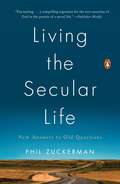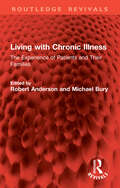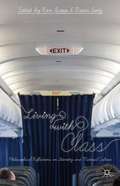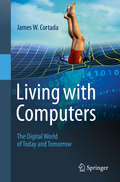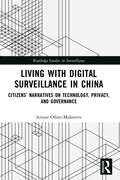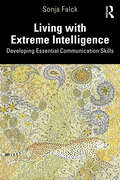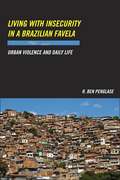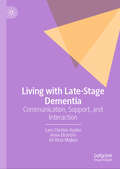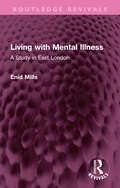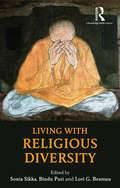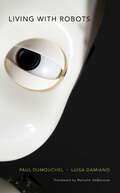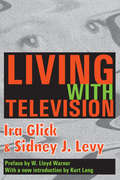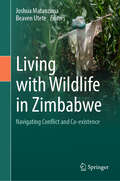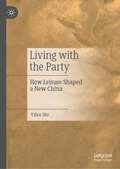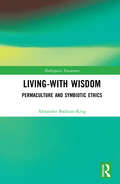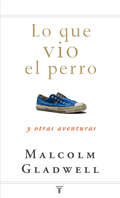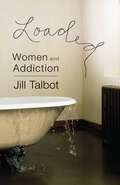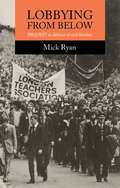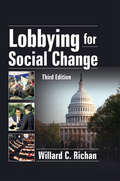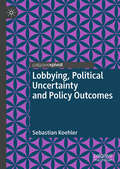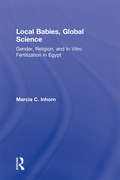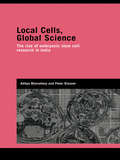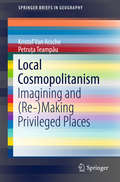- Table View
- List View
Living the Secular Life
by Phil ZuckermanA Best Book of 2014, Publishers Weekly "Zuckerman is a sociologist who in this groundbreaking book writes clearly, offers unobtrusive statistical support, and provides a persuasive and comprehensive look at the growing contemporary phenomenon of people who choose to live without religion, but with ethics and meaning in their lives." Over the last twenty-five years, "no religion" has become the fastest-growing religion in the United States. Around the world, hundreds of millions of people have turned away from the traditional faiths of the past and embraced a moral yet nonreligious--or secular--life, generating societies vastly less religious than at any other time in human history. Revealing the inspiring beliefs that empower secular culture--alongside real stories of nonreligious men and women based on extensive in-depth interviews from across the country--Living the Secular Life will be indispensable for millions of secular Americans. Drawing on innovative sociological research, Living the Secular Life illuminates this demographic shift with the moral convictions that govern secular individuals, offering crucial information for the religious and nonreligious alike. Living the Secular Life reveals that, despite opinions to the contrary, nonreligious Americans possess a unique moral code that allows them to effectively navigate the complexities of modern life. Spiritual self-reliance, clear-eyed pragmatism, and an abiding faith in the Golden Rule to adjudicate moral decisions: these common principlesare shared across secular society. Living the Secular Life demonstrates these principles in action and points to their usage throughout daily life. Phil Zuckerman is a sociology professor at Pitzer College, where he studied the lives of the nonreligious for years before founding a Department of Secular Studies, the first academic program in the nation dedicated to exclusively studying secular culture and the sociological consequences of America's fastest-growing "faith." Zuckerman discovered that despite the entrenched negative beliefs about nonreligious people, American secular culture is grounded in deep morality and proactive citizenship--indeed, some of the very best that the country has to offer. Living the Secular Life journeys through some of the most essential components of human existence--child rearing and morality, death and ritual, community and beauty--and offers secular readers inspiration for leading their own lives. Zuckerman shares eye-opening research that reveals the enduring moral strength of children raised without religion, as well as the hardships experienced by secular mothers in the rural South where church attendance defines the public space. Despite the real sorrows of mortality, Zuckerman conveys the deep psychological health of secular individuals in their attitudes toward illness, death, and dying. Tracking the efforts of nonreligious groups to construct their own communities, Zuckerman shows how Americans are building institutions and cultivating relationships without religious influence. Most of all, Living the Secular Life infuses the sociological data and groundbreaking research with the moral convictions that govern secular individuals, and demonstrates how readers can integrate these beliefs into their own lives. A manifesto for a booming social movement--and a revelatory survey of this overlooked community--Living the Secular Life offers essential and long-awaited information for anyone building a life based on his or her own principles. an interest in Dawkins, Harris, Hitchens, et al., you certainly need to pick this book up and find out where things are headed." Bart Campolo, author Things We Wish We Had Said "Since coming out as a post-Christian minister, I've discovered all kinds of people sincerely pursuing goodness without the nurture, encouragement, and mutual support most church folks take for granted. These folks are hungry for fellowship and pastoral care, but even hungrier for a thoughtful, positive way to communicate their values and commitments to friends and family...
Living the Secular Life
by Phil Zuckerman"A humane and sensible guide to and for the many kinds of Americans leading secular lives in what remains one of the most religious nations in the developed world." --The New York Times Book Review Over the last twenty-five years, "no religion" has become the fastest-growing religious preference in the United States. Around the world, hundreds of millions of people have turned away from the traditional faiths of the past and embraced a moral yet nonreligious--or secular--life, generating societies vastly less religious than at any other time in human history. Revealing the inspiring beliefs that empower secular culture--alongside real stories of nonreligious men and women based on extensive in-depth interviews from across the country--Living the Secular Life will be indispensable for millions of secular Americans.Drawing on innovative sociological research, Living the Secular Life illuminates this demographic shift with the moral convictions that govern secular individuals, offering crucial information for the religious and nonreligious alike. Living the Secular Life reveals that, despite opinions to the contrary, nonreligious Americans possess a unique moral code that allows them to effectively navigate the complexities of modern life. Spiritual self-reliance, clear-eyed pragmatism, and an abiding faith in the Golden Rule to adjudicate moral decisions: these common principles are shared across secular society. Living the Secular Life demonstrates these principles in action and points to their usage throughout daily life.Phil Zuckerman is a sociology professor at Pitzer College, where he studied the lives of the nonreligious for years before founding a Department of Secular Studies, the first academic program in the nation dedicated to exclusively studying secular culture and the sociological consequences of America's fastest-growing "faith." Zuckerman discovered that despite the entrenched negative beliefs about nonreligious people, American secular culture is grounded in deep morality and proactive citizenship--indeed, some of the very best that the country has to offer.Living the Secular Life journeys through some of the most essential components of human existence--child rearing and morality, death and ritual, community and beauty--and offers secular readers inspiration for leading their own lives. Zuckerman shares eye-opening research that reveals the enduring moral strength of children raised without religion, as well as the hardships experienced by secular mothers in the rural South, where church attendance defines the public space. Despite the real sorrows of mortality, Zuckerman conveys the deep psychological health of secular individuals in their attitudes toward illness, death, and dying. Tracking the efforts of nonreligious groups to construct their own communities, Zuckerman shows how Americans are building institutions and cultivating relationships without religious influence. Most of all, Living the Secular Life infuses the sociological data and groundbreaking research with the moral convictions that govern secular individuals and demonstrates how readers can integrate these beliefs into their own lives.A manifesto for a booming social movement--and a revelatory survey of this overlooked community--Living the Secular Life offers essential and long-awaited information for anyone building a life based on his or her own principles. an interest in Dawkins, Harris, Hitchens, et al., you certainly need to pick this book up and find out where things are headed." Bart Campolo, author Things We Wish We Had Said "Since coming out as a post-Christian minister, I've discovered all kinds of people sincerely pursuing goodness without the nurture, encouragement, and mutual support most church folks take for granted. These folks are hungry for fellowship and pastoral care, but even hungrier for a thoughtful, positive way to communicate their values and commitments to friends and family members instinctively distrustful of anyone who doesn't believe in God. For them--and for me--Phil Zuckerman is a genuine hero, and Li...
Living with Alzheimer's: Managing Memory Loss, Identity, and Illness
by Renée L. BeardNews of Alzheimer’s disease is constantly in the headlines. Every day we hear heart-wrenching stories of people caring for a loved one who has become a shell of their former self, of projections about rising incidence rates, and of cures that are just around the corner. However, we don't see or hear from the people who actually have the disease. In Living with Alzheimer’s, Renée L. Beard argues that the exclusively negative portrayals of Alzheimer’s are grossly inaccurate. To understand what life with memory loss is really like, Beard draws on intensive observations of nearly 100 seniors undergoing cognitive evaluation, as well as post-diagnosis interviews with individuals experiencing late-in-life forgetfulness. Since we all forget sometimes, seniors with an Alzheimer’s diagnosis ultimately need to be socialized into medicalized interpretations of their forgetfulness. In daily life, people with the disease are forced to manage stigma and the presumption of incompetence on top of the actual symptoms of their ailment. The well-meaning public, and not their dementia, becomes the major barrier to a happy life for those affected. Beard also examines how these perceptions affect treatment for Alzheimer’s. Interviews with clinicians and staff from the Alzheimer’s Association reveal that despite the best of intentions, pejorative framings of life with dementia fuel both clinical practice and advocacy efforts. These professionals perpetuate narratives about “self-loss,” “impending cures,” and the economic and emotional “burden” to families and society even if they do not personally believe them. Yet, Beard also concludes that in spite of these trends, most of the diagnosed individuals in her study achieve a graceful balance between accepting the medical label and resisting the social stigma that accompanies it. In stark contrast to the messages we receive, this book provides an unprecedented view into the ways that people with early Alzheimer’s actively and deliberately navigate their lives.
Living with Chronic Illness: The Experience of Patients and Their Families (Routledge Revivals)
by Michael Bury Robert AndersonFirst published in 1988, Living with Chronic Illness presents a vivid account of the reality of life with chronic illness – from the perspective of patients and their families. The authors look at the expectations, priorities, and problems of those most affected by chronic illness, and examine the strategies they have developed to cope with their considerable disadvantages. The experience of carers, the ways in which their problems change over time, are also major themes in the book.The book looks at the everyday life of people with the following conditions: stroke, renal failure, multiple sclerosis, Parkinson’s disease, arthritis, heart attack, epilepsy, rectal cancer, psoriasis, and diabetes. In each case, an overview of the consequences of a particular illness is presented, before discussion of specific problems in daily life – maintaining family relationships, managing treatment regimes, coping with work and home commitments, and living with bodily change and social stigma.This volume will be of importance to all those concerned with providing support and planning care for the chronically ill – in the health and social services and in voluntary organizations. Students of medical sociology, policy makers and planners will also find the insights and research presented here valuable in the understanding of the daily life of people with chronic illness. It will also be of use for those in professional training, in nursing, social work, general practice and related areas.
Living with Class
by Brian Seitz Ron ScappA philosophical-cultural exploration, this book expands the discussion of "class" from a novel perspective. Following the current debates about wealth and class, the contributors address the social and cultural phenomena of class from a uniquely innovative philosophical approach and reconsider philosophical "givens" within the context of culture.
Living with Computers: The Digital World of Today and Tomorrow
by James W. CortadaThe computing technology on which we are now so dependent has risen to its position of ascendency so rapidly that few of us have had the opportunity to take a step back and wonder where we are headed. This book urges us to do so.Taking a big-picture perspective on digital technology, Living with Computers leads the reader on a whistle-stop tour of the history of information and information technology. This journey culminates in a deep exploration into the meaning and role of computers in our lives, and what this experience might possibly mean for the future of human society – and the very existence of humanity itself.In the face of the transformative power of computing, this book provokes us to ask big questions. If computers become integrated into our bodies, merging with the information processing of our very DNA, will computing help to shape the evolution of biological life? If artificial intelligence advances beyond the abilities of the human brain, will this overturn our anthropocentrism and lead to a new view of reality? Will we control the computers of the future, or will they control us?These questions can be discomforting, yet they cannot be ignored. This book argues that it is time to reshape our definition of our species in the context of our interaction with computing. For although such science-fiction scenarios are not likely to happen any time soon – and may, in fact, never happen – it is nevertheless vital to consider these issues now if we wish to have any influence over whatever is to come. So, humans, let’s confront our possible destiny!James W. Cortada is a Senior Research Fellow at the Charles Babbage Institute at the University of Minnesota. He holds a Ph.D. in modern history and worked at IBM in various positions for 38 years, including in IBM’s management research institute, The IBM Institute for Business Value (IBV). He is the author of over a dozen books on management, and nearly two dozen books on the history of information technology. These include the Springer title From Urban Legends to Political Fact-Checking: Online Scrutiny in America, 1990-2015 (with William Aspray).
Living with Digital Surveillance in China: Citizens’ Narratives on Technology, Privacy, and Governance (Routledge Studies in Surveillance)
by Ariane Ollier-MalaterreDigital surveillance is a daily and all-encompassing reality of life in China. This book explores how Chinese citizens make sense of digital surveillance and live with it. It investigates their imaginaries about surveillance and privacy from within the Chinese socio-political system. Based on in-depth qualitative research interviews, detailed diary notes, and extensive documentation, Ariane Ollier-Malaterre attempts to ‘de-Westernise’ the internet and surveillance literature. She shows how the research participants weave a cohesive system of anguishing narratives on China’s moral shortcomings and redeeming narratives on the government and technology as civilising forces. Although many participants cast digital surveillance as indispensable in China, their misgivings, objections, and the mental tactics they employ to dissociate themselves from surveillance convey the mental and emotional weight associated with such surveillance exposure. The book is intended for academics and students in internet, surveillance, and Chinese studies, and those working on China in disciplines such as sociology, anthropology, social psychology, psychology, communication, computer sciences, contemporary history, and political sciences. The lay public interested in the implications of technology in daily life or in contemporary China will find it accessible as it synthesises the work of sinologists and offers many interview excerpts.
Living with Extreme Intelligence: Developing Essential Communication Skills
by Sonja FalckIn Living with Extreme Intelligence: Developing Essential Communication Skills, Dr Sonja Falck provides a unique and practical manual of how to improve interpersonal interactions that involve adults who stand out from the neurotypical majority by having top 2% IQ. Her main message is that understanding the individual differences involved in extreme intelligence and mastering relevant communication skills can break through barriers of frustration, underachievement, and loneliness, to bring about brain-changingly positive conversations and interpersonal effectiveness, connection, and joy. Dr Falck begins by explaining the neurophysiological and social foundations of why we communicate the way we do, and then explains in detail seven essential communication skills. Following this, she shows how to put these skills into practice, applying insights from depth psychology and demonstrating how to have better conversations in a variety of contexts from general social gatherings to the workplace and intimate relationships. Particular attention is paid to areas that Dr Falck’s research and professional practice have repeatedly shown her are challenging for adults with extreme intelligence, such as small talk, office politics, dating, and handling conflict. She draws on case examples from her consulting work (psychotherapy and coaching) with clients who have extreme intelligence, and examples from novels, cinema, the media, the literature on giftedness, and biographical material on high-profile high-IQ figures like Steve Jobs, Elon Musk and Lady Gaga. Throughout she emphasizes the theme from her original model of interpersonal relating, which is that experiencing freedom of self-expression with others who offer you a high level of acceptance is what puts you in a state of thriving. The book provides step-by-step guidance for engaging in numerous interpersonal situations, such as how to handle difficult conversations, how to write effective emails, how to breathe, listen, play, take a risk, bond, repair a broken connection, and keep yourself well through changes like failure, success, and falling in love. It is essential reading for anyone affected by, or interested in, issues associated with extremely high intelligence.
Living with Insecurity in a Brazilian Favela
by R. Ben PenglaseThe residents of Caxambu, a squatter neighborhood in Rio de Janeiro, live in a state of insecurity as they face urban violence Living with Insecurity in a Brazilian Favela examines how inequality, racism, drug trafficking, police brutality, and gang activities affect the daily lives of the people of Caxambu. Some Brazilians see these communities, known as favelas, as centers of drug trafficking that exist beyond the control of the state and threaten the rest of the city. For other Brazilians, favelas are symbols of economic inequality and racial exclusion. Ben Penglase's ethnography goes beyond these perspectives to look at how the people of Caxambu themselves experience violence Although the favela is often seen as a war zone, the residents are linked to each other through bonds of kinship and friendship. In addition, residents often take pride in homes and public spaces that they have built and used over generations. Penglase notes that despite poverty, their lives are not completely defined by illegal violence or deprivation. He argues that urban violence and a larger context of inequality create a social world that is deeply contradictory and ambivalent. The unpredictability and instability of daily experiences result in disagreements and tensions, but the residents also experience their neighborhood as a place of social intimacy. As a result, the social world of the neighborhood is both a place of danger and safety.
Living with Late-Stage Dementia: Communication, Support, and Interaction
by Lars-Christer Hydén Anna Ekström Ali Reza MajlesiThis book investigates how people living with late-stage dementia can engage in communication and social interaction. Based on empirical research, it explores the remaining communicative resources of people living with cognitive impairment (e.g., intercorporeal interaction, bodily gestures, gaze), presenting the agency of the person with dementia as an integral part of their relations with others. The book provides a comprehensive theoretical framework for analyzing, describing, and understanding communication in late-stage dementia, and explores the use of video ethnography to record and analyze non-verbal, bodily interaction. The authors skilfully bring together findings from their examinations of everyday interactions involving individuals living with late-stage dementia in nursing facilities, introducing the readers to the innovative theoretical and methodological approaches that undergird the fine-grained analyses at the heart of the book. The rich and nuanced case studies collected encompass embodied directives, habitual actions and objects, physical settings, assisted eating, and much more. An invaluable resource for graduate students and researchers at all levels in the fields of psychology, psychotherapy, social work, nursing, gerontology, and related disciplines, this volume makes an unparalleled contribution to current dementia research across the social sciences.
Living with Mental Illness: A Study in East London (Routledge Revivals)
by Enid MillsThe Mental Health Act of 1959 marked a turning point in national policy on mental illness. Originally published in 1962, this book reports a sociological survey of a group of people from an East London borough who entered a large mental hospital in 1956 and 1957, at the very time when a Royal Commission was preparing the report upon which the new legislation was based. Living with Mental Illness shows what happened to these mental patients and to their relatives, and tells of their reactions and impressions. The impact of mental illness on their domestic and social circumstances is described, as is the part played in their lives by the social services; and the relationship between people’s perceptions of mental illness and their attitudes to hospital is discussed. Enid Mills considers the prospects for ‘community care’ of the mentally ill in the borough studied, and concludes, as Professor Morris Carstairs says in his Foreword, with ‘a review of the difficulties which must be overcome if the transition is to be effected from an outmoded, remote mental hospital system to a community-based service which will be at once efficient and humane’.
Living with Religious Diversity
by Sonia Sikka Lori G. Beaman Bindu PuriLooking beyond exclusively state-oriented solutions to the management of religious diversity, this book explores ways of fostering respectful, non-violent and welcoming social relations among religious communities. It examines the question of how to balance religious diversity, individual rights and freedoms with a common national identity and moral consensus. The essays discuss the interface between state and civil society in ‘secular’ countries and look at case studies from the the West and India. They study themes such as religious education, religious diversity, pluralism, inter-religious relations and exchanges, dalits and religion, and issues arising from the lived experience of religious diversity in various countries. The volume asserts that if religious violence crosses borders, so do ideas about how to live together peacefully, theological reflection on pluralism, and lived practices of friendship across the boundaries of religious identity-groupings. Bringing together interdisciplinary scholarship from across the world, the book will interest scholars and students of philosophy, religious studies, political science, sociology and history.
Living with Robots
by Paul Dumouchel Luisa DamianoFrom artificial intelligence to artificial empathy, “a timely and well-written volume that addresses many contemporary and future moral questions” (Library Journal).Today’s robots engage with human beings in socially meaningful ways, as therapists, trainers, mediators, caregivers, and companions. Social robotics is grounded in artificial intelligence, but the field’s most probing questions explore the nature of the very real human emotions that social robots are designed to emulate.Social roboticists conduct their inquiries out of necessity—every robot they design incorporates and tests a number of hypotheses about human relationships. Paul Dumouchel and Luisa Damiano show that as roboticists become adept at programming artificial empathy into their creations, they are abandoning the conventional conception of human emotions as discrete, private, internal experiences. Rather, they are reconceiving emotions as a continuum between two actors who coordinate their affective behavior in real time. Rethinking the role of sociability in emotion has also led the field of social robotics to interrogate a number of human ethical assumptions, and to formulate a crucial political insight: there are simply no universal human characteristics for social robots to emulate. What we have instead is a plurality of actors, human and nonhuman, in noninterchangeable relationships.Foreshadowing an inflection point in human evolution, Living with Robots shows that for social robots to be effective, they must be attentive to human uniqueness and exercise a degree of social autonomy. More than mere automatons, they must become social actors, capable of modifying the rules that govern their interplay with humans.“A detailed tour of the philosophy of artificial intelligence (AI)?especially as it applies to robots intended to build social relationships with humanity. . . . If we are to build a robust, appropriate ethical structure around the next generation of technical development?some combination of deep learning, artificial intelligence, robotics and artificial empathy?we need to understand that managing the impact of these technologies is far too important to be left to those who are enthusiastically engaged in producing them.” —Times Higher Education
Living with Television
by Ira D. Glick Sidney J. Levy W. Lloyd Warner Kurt LangThis book is based on extensive field research conducted by the investigators of Social Research Inc., interpreting the result of over 13,000 individuals. Members of TV audiences were studied to analyze their reactions to what TV offered them, in relation to their age, sex, social class, and personal characteristics. This information is here applied to understanding what television programs, performers, and commercials--by general type and also with illustrative case histories--are being watched. This book on first publication in 1962 provided the first clear image of the people in front of their TV sets, who they were, how they differed from each other, their views on sex and violence, boredom and enlightenment, taste and judgment. It tells us about the audiences and our stereotypes and their response to the new medium they could both see and hear. It destroys the myth of the "mass audience" and replaces it with a scientifically derived description of the many audiences for television, including its protesters, its embracers, and its accommodators. Programs looked at range from those still in production forty years later--The Price is Right--to those in perpetual rerun--The Twilight Zone---to those genres, like westerns, that have all but disappeared, and those that still prosper, like soap operas--in this case, 77 Sunset Strip. A section on performer images and their symbolic meanings considers television personas from Bob Hope through Walter Cronkite to Roy Rogers and Pat Boone. The final section analyzes commercials both by type and by placement and what audiences feel about them.
Living with Wildlife in Zimbabwe: Navigating Conflict and Co-existence
by Joshua Matanzima Beaven UteteThis book provides a critical analysis of the interactions of humans and wildlife in Zimbabwe. It does not only document conflicts, but it also considers opportunities for co-existence that can result in the successful conservation practices within protected areas. The book offers empirically rich case studies from across different areas of Zimbabwe both urban and rural where people interact with animals both negatively and positively. Chapters in the book discuss these interactions through the different lens including the contemporary politico-economic crises prevalent in Zimbabwe, the failures and successes of the CAMPFIRE programme, and gender dynamics of conflicts. The book provides an update into the human–wildlife interactions situation in Zimbabwe. Data presented has policy implications within Zimbabwe and beyond. It contributes to different categories policy and mitigation measures including HWC mitigation strategies as well as conservation policy. Beaven Utete and Joshua Matanzima have brought together a fascinating collection of papers on human-wildlife conflict and coexistence in Zimbabwe. The authors highlight the views, values and needs of people living with wildlife. Voices that are still too often ignored in conservation practice, policy and science. This is essential reading for anyone interested in decolonizing conservation and the future of wildlife in Africa. Professor Jan van der Ploeg, Professor Inclusive Conservation, Van Hall Larenstein University of Applied Sciences, The Netherlands This is a valuable collection from a country we should hear much more from in the field of human-wildlife interactions studies. In addition to providing interesting case studies and data from Zimbabwe to inform and inspire international conservation efforts, I hope it will galvanize national and local efforts to tackle the complex challenges ahead for biodiversity conservation in Zimbabwe. Professor Simon Pooley, IUCN SSC Specialist Group on Human-Wildlife Conflict and Coexistence
Living with the Party: How Leisure Shaped a New China
by Yifan ShiThis book explores the subcultures, cultural trends and regulations of leisure and subcultures among young people in Beijing from 1949 to the 1980s. It complicates our understanding of the successes of the CCP and the nature of those successes—more a synergy or synthesis than victory over society or defeat. It argues that while the CCP aimed to direct the most private sphere in people’s everyday life (i.e., leisure), it did not achieve this goal by coercive means, but by appealing ways through organized leisure activities. This book suggests that although elements of youth subcultures can be observed throughout the Mao era, we should not treat them as a way of passive resistance. Instead, we must position these subcultures between different layers of the Party’s leisure regulation to examine what the CCP actually achieved. Many people who engaged in subcultures defied the blatant politicization of their leisure, some might have defied the process of collectivization, but few defied the process of institutionalization during which people did not find state intervention contradictory to their own way of pleasure-seeking. This book also suggests that instead of regarding the Deng Xiaoping era as a breakaway from Maoist interventionist rule, we need to see the historical continuity as revealed by the Party’s uninterrupted policy of leisure regulation. Thought provoking and at times amusing, this book will interest sinologists, historians, and scholars of China's social form.
Living-With Wisdom: Permaculture and Symbiotic Ethics (Multispecies Encounters)
by Alexander Badman-KingLiving-With Wisdom explores the way in which ancient Greek models of philosophy as an attempt to live ‘the good life’ can and should be realised through the practice of permaculture. Following the thought of Plato and Aristotle, the author places the achievement of wisdom and fulfilment at the centre of the good life, identifying these with the achievement of a complex admixture of virtues, which are dependent on an appreciation of goodness itself. The book then examines the manner in which permaculture – or the practice of sustainable farming or ethical gardening – can provide us with the best opportunity to acquire this ‘moral knowledge’ through the close relationships we can have with other living beings and things. A study of the nature of wisdom and a means of ‘living-with philosophy’, Living-With Wisdom: Permaculture and Symbiotic Ethics reveals that it is by appreciating and sharing in the lives of other organisms that we engage with many dilemmas of life and death and have the opportunity to exercise the virtues. As such, it will appeal to scholars of philosophy, social theory and anthrozoology with interests in virtue ethics, environmental ethics, animal ethics and human-animal relations.
Lo que vio el perro: y otras aventuras
by Malcolm GladwellLos mejores reportajes del autor de los best sellers La clave del éxito y Fueras de serie. Sólo poniéndose en la piel de un perro, pensó Gladwell, podría destapar los secretos de César Millán, el «encantador de perros», capaz de calmar al animal más inquieto o enfurecido con un simple gesto. El ensayo que da título a este libro es un divertido y eficaz ejemplo del método gladwelliano, consistente en «mirar el problema con ojos ajenos». Gladwell nos trae historias de todos los rincones del mundo moderno: investiga las agridulces vidas de genios menores, audaces y obsesivos como el señor Heinz, responsable de que sólo exista un tipo de ketchup frente a docenas de variedades de mostaza; nos revela la trascendencia de la evolución del tinte capilar en la historia del siglo XX; compara los métodos de búsqueda de armas de destrucción masiva con los de detección del cáncer. Autor de tres best sellers que han dado un vuelco a nuestra manera de entender el mundo, Gladwell ha elegido los que consideraba sus mejores artículos, diseminados en distintos números de la mítica revista The New Yorker y nueva muestra de su insaciable curiosidad. Reseñas:«Un libro magnífico que reúne el estilo de escritura que ha hecho de Gladwell la extraordinaria figura que es hoy.»The Guardian «Gladwell es probablemente el mejor exponente de la reciente tendencia de libros que intentan revelarnos los secretos de nuestro complejo mundo a través del prisma de las ciencias sociales.»Financial Times «Algunos capítulos de Lo que vio el perro son obras maestras del arte del ensayo.»The New York Times «Malcolm Gladwell, escritor de éxito masivo, se ha convertido en uno de los grandes especialistas de nuestro tiempo en iluminar las zonas de sombra con su mezcla de periodismo, estudios científicos, historia y filosofía. Amante de llevar la contraria [...] Su objetivo es colocar junto a la certeza un signo de interrogación. [...] Gladwell define su trabajo como "no ficción pop". [...] Es un cheerleader de las ciencias sociales. [...] A la vista de los millones de lectores que han devorado sus libros, cabría decir que hay algo tranquilizador en ver ideas confirmadas por los estudios citados. También es curioso y seductor.»El País Semanal «Un mago en los libros de autoayuda. [...] Con más de 10 millones de ejemplares vendidos, Malcolm Gladwell es uno de los principales escritores "motivacionales", gurú del éxito y analista de "estrategias para triunfar". La clave del éxito, Inteligencia intuitiva, Lo que vio el perro y Fueras de serie son libros que ejecutivos y líderes de todo tipo devoran en los aeropuertos.»La Gaceta de los negocios
Loaded: Women and Addiction
by Jill TalbotHaving an addiction can follow the path of a great relationship that goes sour: there's the first blush of romance, the seduction ("you know you want to"), and the downward spiral into either obsession or breaking free.Jill Talbot is no stranger to addiction. Part autobiography, part exposé, Loaded: Women and Addiction weaves Talbot's own battles with addiction with various addiction stories of other women. The result is a captivating, honest look at the allure of addiction-be it to sex, drugs, alcohol, food, adventure, or infidelity-and ultimately its betrayal.Though addiction can be seductive, if you're waking up with guilt or making choices that harm others, it's probably a clue that things are out of control. Throughout Loaded, Talbot's razor-sharp honesty, heartbreaking self-awareness, and resolve to reveal the difficult truth of her relationship with past and present addictions is humbling and sometimes gut-wrenching. In sharing her struggles and her resolve to attain control over her addictions, Talbot speaks her truth while sending a message of hope to women everywhere.
Lobbying From Below
by Mick RyanFirst Published in 1996. Routledge is an imprint of Taylor & Francis, an informa company.
Lobbying for Social Change
by Willard C. RichanThis step-by-step guide to lobbying covers it all-from the basics for beginners to specific techniques for experienced lobbyists"You and I may never achieve major public office, but we do not need to in order to affect public policy."-Author Willard C. RichanTo effect social change, any lobbyist&’s case must be presented with skill, knowledge, and confidence. This reader-friendly book shows the way. It assumes no prior knowledge of the subject and provides the nuts and bolts of public policy advocacy (lobbying) in non-technical language. Lobbying for Social Change, Third Edition is organized in a way that easily lends itself to use in the classroom as well as by individual or group advocates, and it is packed with clearly presented case material that illustrates the lobbying process in action. This new edition provides updated case material, expanded coverage of electronic media, and two new chapters; one focusing on direct action for fundamental change, and the other presenting a case history of a grassroots lobbying campaign.Part I of Lobbying for Social Change, Third Edition, entitled "The Basics," will show you how to: assess your political resources set an agenda for action understand whom to lobby-and how to gauge their power, motivation, and ability to effect or impede social change gather and use evidence to support your positionPart II, "Practical Applications," gives you nuts-and-bolts information about how lobbying is done. You&’ll learn: how to work directly with policymakers-face-to-face, by mail, by telephone, etc. effective rules for to testifying in a public hearing how to make use of the mass media-writing news releases, participating in panel discussions, what to do when being interviewed (and how to increase your chances of being a repeat guest on talk and news shows), and how to effectively work with print and electronic media, including the Internet ways to take on the system through direct actionPart III, "Case History of a Grassroots Lobbying Campaign," takes you inside an actual campaign (in this case, to amend the impending-at the time-welfare reform bill). You&’ll see how a group of five Philadelphia area social workers and one feminist activist started the Delaware County Coalition to Save Our Safety Net-a coalition that would make a substantial impact on the specifics of welfare in the state of Pennsylvania.This new edition of the classic manual for lobbyists is packed with vital information for lobbying in the new millennium. We urge you to consider making it a part of your personal or teaching collection today!
Lobbying, Political Uncertainty and Policy Outcomes
by Sebastian KoehlerThis book analyses interest group communication strategies in parliamentary political systems, and considers how political uncertainty, which emerges from the political process, shapes interest group communication strategies. It develops a formal model of lobbying in a bicameral legislature with strong party discipline, and discusses why interest groups choose public or private communication channels to influence political bargaining. The book tests its hypothesis in different policy contexts, including lobbying on major legislation in the field of labour and social policy.
Local Babies, Global Science: Gender, Religion and In Vitro Fertilization in Egypt
by Marcia C. InhornIn the late 1990s, Egypt experienced a boom period in in vitro fertilization (IVF) technology and now boasts more IVF clinics than neighboring Israel. In this book, Marcia Inhorn writes of her fieldwork among affluent, elite couples who sought in vitro fertilization in Egypt, a country which is not only at the forefront of IVF technology in the Middle East, but also a center of Islamic education in the region. Inhorn examines the gender, scientific, religious and cultural ramifications of the transfer of IVF technology from Euro-American points of origin to Egypt - showing how cultural ideas reshape the use of this technology and in turn, how the technology is reshaping cultural ideas in Egypt.
Local Cells, Global Science: The Rise of Embryonic Stem Cell Research in India (Genetics and Society)
by Aditya Bharadwaj Peter GlasnerOne of the first studies of an exciting new development in global biotechnology, this cutting edge text examines the extent of the transnational movements of tissues, stem cells, and expertise, in the developing governance framework of India. Documenting the impact of local and global governance frames on the everyday conduct of research, this groundbreaking book traces the journey of ‘spare’ human embryos in IVF clinics to public and private laboratories engaged in isolating stem cells for potential therapeutic application. The discussion also examines the gender dimension as a potential site for exploitation in the sourcing of embryonic and other biogenic materials, and suggests that a moral economy has developed in which the ethical values of the global 'North' support and encourage the donation of abundant and ethically ‘neutral’ embryos by the 'South'. This unique exploration is grounded in an empirical, multi-sited ethnographic study that takes a thoroughly comparative analysis of the ethical, religious and social issues in Europe, the United States, and organ donations already prevalent in India. In this theoretically-sensitive analysis, the authors use the resources of social anthropology and the social sciences in an innovative text which will appeal to postgraduates and professionals in the areas of STS studies, genetics, bioethics, and anthropology.
Local Cosmopolitanism
by Kristof Van Assche Petruţa TeampăuThis book offers a unique perspective on cosmopolitanism, examining the ways it is constructed and reconstructed on the small scale in an ongoing process of matching the local with the global, a process entailing mutual transformation. Based on a wide range of literatures and a series of case studies, it analyzes the different versions and functions of cosmopolitanism and points to the need to critically re-examine current conceptions of globalization. The book first illustrates the interplay between networks and narratives in the construction of cosmopolitan communities in three specific cities: Trieste, Odessa and Tbilisi. Each has a past more cosmopolitan than the present and each uses that cosmopolitan past to guide them towards the future. Next, the book focuses on narrative dynamics by isolating several discourses on the cosmopolitan place and figure in European cultural history. It then goes on to detail the internal representations and local functions of larger wholes in smaller communities, shedding a new light on issues of inter- disciplinary interest: self- governance, participation, local knowledge, social memory, scale, planning and development. Of interest to political scientists, anthropologists, economists, geographers and philosophers, this book offers an insightful contribution to theories of globalization and global/ local interaction, bringing the local discursive mechanics into sharper focus and also emphasizing the semi- autonomous character of narrative constructions of self and community in a larger world.
